Buck 65
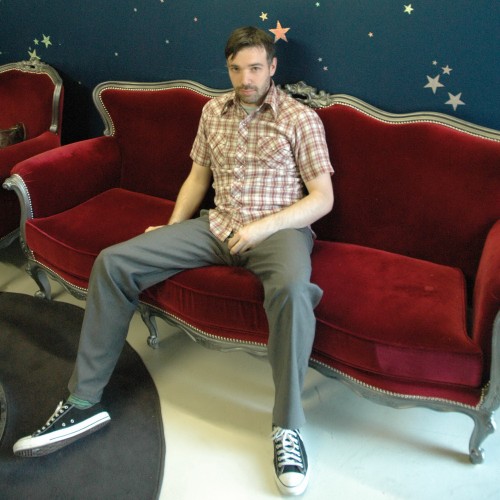
Hip-Hop Core: Some people have criticized "Talkin Honky Blues" as being too clean-sounding and overproduced. Is there a real difference between the way the Language Arts albums were mixed and the way your last albums were engineered?
Buck 65: Yeah, all the old Language Arts albums were done in my bedroom with a very cheap recording device and no compression for my vocals or anything, and then after that I signed a record deal and had a little bit of money to go into the studio. I understand that as a kind of aesthetic thing, some people prefer a lo-fi type of recording but I've always had the opinion that if the songs are good for me, personally I don't care if they are recorded with a million dollar budget or if they are recorded for nothing. I've never really thought about that much, I mean, the most recent recording that I did was back to the old way, recording it in my bedroom with a dirty sock on the microphone and stuff like that. So I don't have a personal preference of whether it's slick or not, really I'm more just concerned with the songs. I suppose there are advantages to both ways but when I think about my favourite songs, some of them were probably made in huge studios, some of them were probably made in someone's bedroom, but I don't really think about it very much.
HHC: The Language Arts series is officially closed, I believe. What does this series mean to you and what was their purpose or their particularity with regards to the rest of your discography?
B65: I had the idea long ago that the fact that I'm a DJ, lyricist and a producer was a unique situation. I found that all three methods were like a form of language, so I just wanted to have a name for this complete practice, and plus this idea of putting an album together as almost using a collage technique of assembly and information. To address the first part of your question, I made a reference to the most recent album I recorded which is called "Strong Arm", it's part seven of the Language Arts series so it's still alive. The newest addition is now maybe one month old and so I think we have seven copies to sell tonight (laughs) because again this is something completely low budget, like making the covers by hand and burning the cd's myself. It's something that I will probably continue to do for as long as I live but for the last album, for example, I had the opportunity of working with people like D-Styles, Tortoise… So when that type of an experience comes along, I think if you're passionate about music it's impossible to say no. I didn't really think fairly that with the last album I could really call it a part of the Language Arts thing because I was working with new people. It was a very interesting and educational experience for me so I hope there's more of that in the future but I also hope there's more work in my bedroom and keeping things simple too. It's strange because like I was saying before some people have a strong preference for clean sounds, working with a budget in a nice studio, working with other people and professionals, or the complete opposite. I have no preferences at all, I really like both, so I will probably always do both.
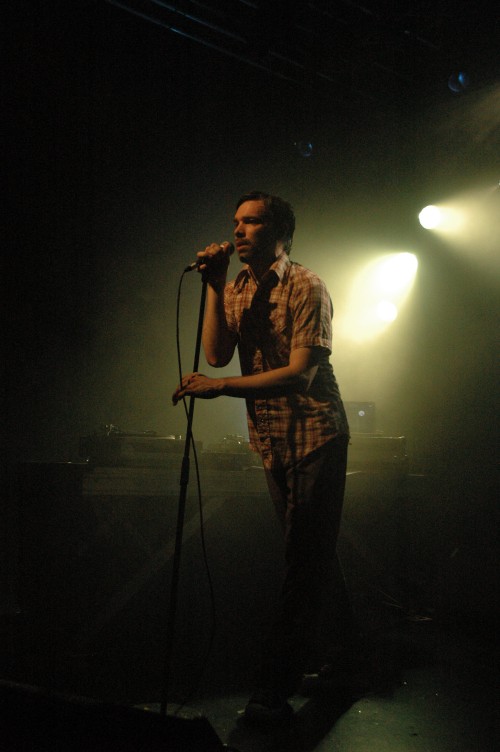
HHC: Speaking about the past, if you hadn't injured your knee, would you ever have considered being a musician or would you simply be a professional baseball player by now?
B65: When I was young I was doing both, I used to play baseball and make music. So it's easy to imagine that if I'd continued playing baseball, I would still be doing both. But probably not. It's difficult to imagine making music on the level I am now because it requires so much time. So I know there are a few major league professional baseball players who are also musicians, and in fact in the eighties there were a few guys who did make albums, with well known producers, I have some of these records in my collection. It's possible because you play baseball only in the summer so it leaves a lot of free time. I think about it all the time, but this knee you can see, this big ball here which doesn't belong, that's why I can't.
HHC: Some years down the line, what will you think of your Stinkin' Rich days?
B65: That's another area where my feelings are very mixed because sometimes I go back and listen to that stuff and I feel really excited and I really love it. And then other times I go back and listen to it and I feel a little bit embarrassed because even though there was something exciting about it and it was very much in a hip-hop framework that most people understand, it really wasn't honest at all. I was really just pretending to be something else and that makes me a little bit uncomfortable now. Maybe this is just something that someone who is a little bit older would say, but that's generally something I'm very uncomfortable with, whether it's with myself in the past or anyone else, when I see somebody who is so insecure that they find it impossible just to be honest about who they are, it bothers me. It's a strange period but I really wonder if I had continued and made music in this way, where would it have ended up? Because maybe it sounds like a ridiculous statement to make but it was almost like Eminem, but years before Eminem happened. I can remember that when I was making music at the beginning, to see white people in hip-hop was very rare, so maybe it was just a question of "the right timing", but when Eminem was discovered I think it was the time when someone thought "Oh! A white guy who's making this kind of music is exciting!, and like it's a whole new thing that maybe we can use as marketing and it could become very successful". It's a curious thing to wonder whether if I had kept doing the same music, the same recognition could have happened for me. And in fact, there's even a small part of me I can remember at that time that used to think, this is something unique. I remember wondering if this could be the sort of thing that would be interesting or appealing to a big label. When I was young, I really wanted to have a record deal, and then when I got older I didn't want a record deal anymore and that's when I got one (laughs). Which would be the way the universe works (laughs).
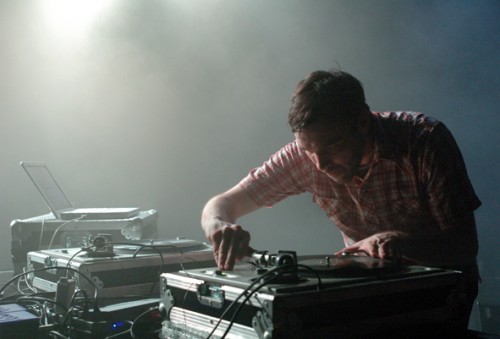
HHC: What is your favourite solo album (apart from the last one) and why?
B65: It's very difficult to choose but for a long time I was always answering that question by saying "Vertex". But not too long ago, just for exercise, I listened to everything I ever recorded back to back and after doing that I think I came to the conclusion that I actually like "Man Overboard" even more. This album is very similar to "Vertex" and the Language Arts that came before it, and after that I really felt like "Ok! I can't keep making the same album over and over my whole life", but there are some very important changes that begin to happen with "Man Overboard", and I think it's because I recorded this album at the time when my mother died. This album represents a very important moment in my evolution and development as a person and also as a person who makes music, because I think it's on this album that you can really for the first time see the real person who is behind the music. I don't know why but this is something important for me. The music is interesting and very experimental, there's a real atmosphere but it's also very human and it's the first album that has a lot of real honest expression too. Technically the album is a mess and it really sounds terrible. I recorded it three times, I would build it and then destroy it, and I built it for the third time just using pieces of the old versions, in this sense it's a real disaster, but it's like I was saying before, for me I don't think that really matters. If the material is interesting or the sounds are good, to me anyway and maybe to some other people too, it doesn't really matter if it sounds like garbage, the idea still comes through and the emotions are still there. It's an album that would never get played on the radio in a million years, but I really like the material on that one. Today I'm saying "Man Overboard" but if you ask me tomorrow the answer could be different. (laughs)
HHC: "Secret House Against The World" has been very well received by the European public, even from your fans who go way back…
B65: That's always very difficult to me to know because from the beginning I have never known why anyone has liked my music (laughs). It's really difficult to say because the feedback that I have gotten from this last album, and it's very unique in this way, is that everyone seems to have a different favourite part of the album, a favourite song. Usually every album I have made there is one or two clear favourites, like from "Vertex" people always talked about 'The Centaur' or maybe 'Bachelor Of Science'. But for this one there is no clear favourite, and so I guess maybe this is the strength of that album, the fact that there are a lot of different ideas and maybe something for everybody, and I think it was maybe helped along by the fact that in my mind I was working with absolutely the best DJ in the world (cf: D-Styles) and some of the best living musicians out there, especially drummers. I know for me, when I listen to the album and I take the lyrics away, the music is very exciting and then if I look at the lyrics alone without the music I think it's some of the best writing that I've done yet. I guess that the combination of those two things together, that's what makes it strong. But it's an album I have real conflicted feelings about because it is very new and it is very different from the other albums, that's what I like about it but it's also what I don't like about it, because it was very strange for the first time to say "Ok! I'm gonna work with a lot of different people that I don't know personally". So it was strange to listen to music that I almost don't recognize as my own. To say that this album or any other album has been well received, I don't really know what that means either because I don't think any album I've ever made has sold very many copies (laughs). Some albums I've made critics really liked, other albums critics didn't like so much, this one was a little bit in the middle, people really liked it or didn't like it at all, so that was also very mixed. I do have the idea that this album and maybe a lot of my material has been downloaded a lot, like maybe more than the average musician but it's difficult to know how much! So all I can really do for myself is to watch how people react when I perform material live and I see which songs have a strong reaction, that's basically the only way that I can learn what the public like, but I only think about that then, when I'm performing, which is after I record. To be honest when I'm going to the studio I usually don't think about what anybody is going to think at all - I just think about nowhere. The ideas come from me so I never know what to expect or what people will like. It always surprises me because sometimes I think "people will like this song!" and they don't! And it's some other song that they do.
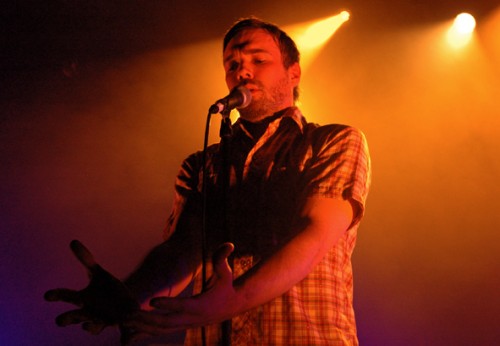
HHC: Why did the 'Secret House Against The World' take so long to be released in the US?
B65: The US market is very strange, it's very different from any other market in the world, especially for anybody who is not making pop music, basically. Of course if you are not doing things completely independently and you are involved in the music business this is a very strange time, because the realities are changing so much and the business seems to be losing so much money, especially in the areas where they always made money in the past by selling records. It seems now that record companies are having the most success with ring tones for telephones and other strange areas like that. So what I am seeing now is that even with smaller labels, they need monetary success more than ever, so when I first signed to a US label, a smaller label which had very interesting artists, I thought "ok, this is not a company that is extremely concerned with having hits and being played on the radio and all that stuff", so it seemed like a good place for me to be, especially in the US. But then this label started going through a lot of changes too and I think that they were looking around at their situation and thinking "ok, this label desperately needs at least one artist who is going to sell a lot of records or is going to be played on the radio" and they felt pressure on different levels and in turn there was a little bit of pressure on me. When I gave them the album "Talkin Honky Blues" they were like "oh, well, we're not too sure and maybe no, we should have something for the radio or a stronger single". And I'm like "this is the album". And then "maybe we could do something different" and they wanted to do this kind of introduction if you will, a strange greatest hits record. And then the new album came around and they were like "oh, we're not sure, and maybe if we make a lot of changes to it…" and this idea was not making me extremely happy. Time was passing and it was just getting later and later and later and finally I said "I just don't want to be here anymore" and so we left. Now the album is very close to one year old so we thought it's probably just too late to release this album here now, and we need to find a new label. So once we find a new label, I think we will just start the new album - probably for next year sometime.
HHC: On the track 'Devil's Eyes (Piano Version)' you sing in French. Is it something that you wanted to do just for fun or does this mean a lot to you now that you live in France?
B65: Yeah I guess there were a few things I was thinking there. One, it's true that I've had good success in France, maybe more success than anywhere else and so in a way I just wanted to show appreciation for that, but also my love for French culture is growing all the time and I'm becoming a bigger and bigger fan of Serge Gainsbourg, who was a very big influence on the last album, that's probably the most important thing. But also in a strange way I have to admit that I was thinking about the US also, because when we first started recording this album we lived in the US and Claire (cf: Buck's girlfriend) is French. It was very strange for me, and I'm sure for Claire also, to see that at that time, because of the war in Iraq, there were anti-french sentiments in the US, and we would see it in very strange places like (to Claire) do you remember the big billboard we saw in New-York for this special on television and it said : "one hour of French culture won't kill you!" or something like that. So there was a part of me where I'm not an extremely political kind of musician but I do have my politics, so when I want to express some political ideas it's always going to be very subtle. And I thought, to have some French content on an album that I thought was going to be released in the US, it was almost like a political statement. So this was also a factor because some of the things that we were hearing in the US were just incredibly stupid and so it seemed like a very subtle way to make people just stop for a minute and think, open their eyes and hopefully realize that some of the things they were saying or thinking were just incredibly ignorant, stupid.
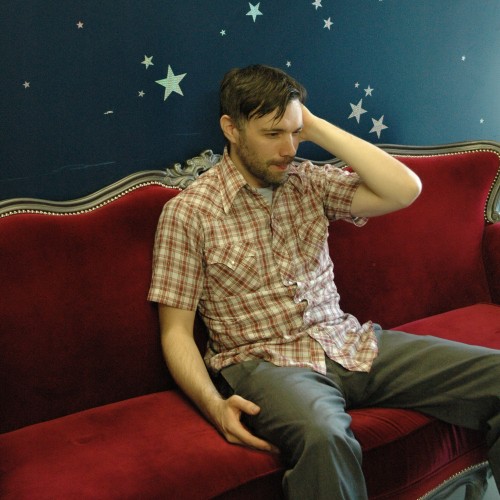
HHC: You've said many times that you can't relate to hip-hop anymore. Is this the main reason why your music evolved to a folk/blues sound?
B65: Not exactly but there is some relation with these ideas. You know it's true, if you look closely on my face you can see grey hair (laughs). I don't think I really meet the definition of young anymore. I'm almost middle aged you know? Well, in any case I'm not a kid anymore. It's strange and I'm sure when I was young I would have really fought this idea strongly, but as I do get older the things that I need from culture are beginning to change a little bit. Movies I liked when I was a kid, I don't like the same films anymore, same with books or with clothes, everything. And it's definitely the same thing with music, mostly I find that the older I get, just the more music I listen to generally, and really I'm interested in everything these days. Although there is some hip-hop music that I still find to be exciting and I listen to old stuff from my collection, which I think is more just like nostalgia and things remembering fine parts of my life. But in terms of music really meaning something to me, when I listen to most hip-hop music, especially the big successful stuff these days, I try to find something that can mean something to me and it's very, very difficult. Having said that, to talk about hip-hop is very complicated because it's a word almost the same as "human beings". When you talk about human beings, you can't say "human beings have blond hair" because some of them do not! It's the same with hip-hop. When people say hip hop, the next question needs to be "what are you talking about more specifically?" Because, when I think about hip-hop, what I like the most is the area of turntablism, if I buy new hip-hop albums now it's these kinds of things that I'm most interested in, and I'm also still very interested and excited by b-boy culture because I find this is an area of the culture that is still advancing very fast and there's still a lot of new ideas. So I think this is important but if you talk to the average person, a random person on the street and you say "hip-hop" to them, then they're probably thinking about the big stars. I think there's a very important distinction there and no-one seems to talk about it, but this type of hip-hop is pop music, there are very important reasons why it's pop music and why it dominates record sales, because it has some elements in common with pop music from the last hundred years. For music to be popular on that level it needs to have certain things, and in this way hip-hop is no different and so a lot of the big most popular hip-hop music I would easily compare to The Monkeys in the sixties, to me it's just not different in any way, it's very light and it just speaks about very simple and basic things. It's actually true that never in my life have I been really interested in pop music, you know maybe sometimes there is a strange thing that comes along that is not very normal pop music that may become interesting, but generally pop music to me is not extremely interesting. Anyway, I'll try to finish the answer (laughs) The way hip-hop music has evolved in some areas has not been completely interesting to me, and my taste in music has changed but also, and this is very important and very simple, now I'm 34 years old, when I made my first album I was 18 years old, and if you compare any 34 year old person to any 18 year old person they're gonna be different people, and really I'm no different in this way. So in the last 15 years that I've made music, I've changed a lot as a person and I think any album I have made has just been a pretty honest reflection of who I am at that moment, and that's always changing.
HHC: You said "The success I've had so far shocks me". Why?
B65: Well, because I think no matter which song of mine you look at, even if it's a song that was a single on a record label with a clip, even a song like 'Devil's Eyes' or 'Kennedy Killed The Hat'; by any kind of popular standards, it's still weird music. I'll be the first person to admit that, there have always been strong experimental aspects to my music. I always wondered why would something that I have to say, something very personal to me, be important to another person; this has a lot to do with just ego and the fact that I guess I'm a humble person. Also it's never really been the case for music - or I should say songs - that are very literate: usually when music is popular, the lyrics are quite simple, it doesn't give to people a lot to think about. When I think about music that I love, where I think the writers are extremely talented and real poets, it's almost never very popular music; and when I listen to the criticism that I know some people have of my music it's that: "Oh, maybe these words would look good on paper but that's not what I want in music!". I understand that, and this is not an area where I want to change so I've always known that my music would never be extremely popular. I'm just a simple person, I grew up in a very small place and five years ago I had a really shitty job and I was already almost 30 years old when I signed a record deal, so when you have lived 30 years of your life doing that thing and just being a bum, and really it's a part of you, it's difficult to leave that behind because it's who you've been for such a long time. There's still a part of me that in a strange way expects that tomorrow I could very easily just go back to working a really crappy job cause it seems it was just yesterday that I was doing that. But I'm happy now, I have a really fun and interesting life now.
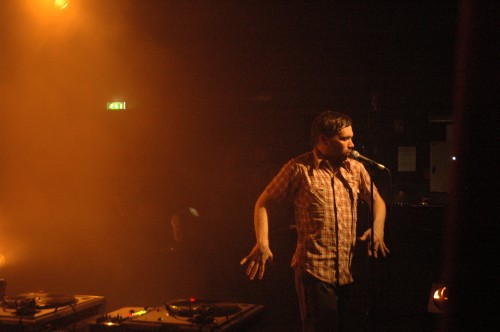
HHC: 'The Centaur' is a track that you don't want to play anymore because you say that it doesn't mean anything to you now. Why did you choose to make an acoustic version of it for "This Right Here Is Buck 65"?
B65: There are two reasons. The first thing is that I wrote this song a long time ago when I was having my first success, even though it was a very small success. I went from being a very average normal person with a small group of friends, to becoming a person where strangers knew who I was, and this was becoming a very uncomfortable idea for me. I found that these same strangers were making assumptions about who I was as a person yet I'd never met these people, I found that very threatening and very uncomfortable, and at times when I was performing and seeing more and more people I sometimes had feelings of anger against the people who were there because it was new and I found it to be very strange. That's really what that song is about, but I don't really have this anger against my audience anymore because I've been doing it for a long time and I'm more comfortable with that now, so in that way for me the song is not relevant and I almost feel guilty when I'm performing the song. It's like saying "you're stupid, you're stupid!" because I don't feel that way. But as far as the new version is concerned, at a certain point, the music I was making began to evolve melodically and I was beginning to work with musicians in a studio, we were also at times performing live. Of course when we started to do shows around the time of 'Talking Honky Blues' we didn't only want to do material from "Talkin Honky Blues", I wanted to do some older material as well, and so I had to teach the band old songs, and as this was happening, new ideas for these old songs were appearing. It was making these old songs new for me again, and I was becoming interested in them again. In some cases I thought "Wow! This is interesting, it's something that some people haven't heard and I really like it!" I thought "Wow! It would be good to record this, but why? because it's old songs and there is no real reason to do that" So I thought for a long time this is just something that will happen in live, but then my label in the US wanted to do this album of old material and I thought: "Here is the situation where maybe this idea make sense!". Also some of those old recordings were of bad quality and some of the new ones were better, so to make an album that has both would be a strange thing to listen to. If everything sounds bad, fine! But a mix would be strange I think and would be very difficult for mastering, so I thought "here is a good excuse to just go back with this old material, do these live versions and finally record them". I also thought that if I only released an album that had the old versions, for anyone who already had them there are no reasons to buy this album at all. And why make an album that people who already know my music won't buy? So if we have new versions of the songs for those people then there is a new reason for them to buy it. In this way I thought it makes sense, but in general when this was first presented to me by the label I thought it was really weird idea (laughs).
HHC: Does the title of the album "This Right Here Is Buck 65" mean that this is the album that represents the best of your music and your state of mind right now for the people who don't know your music yet?
B65: I don't know if it would necessarily represent the best but I thought that it would represent kind of like a spectrum, a mix. I just wanted to put some of the songs that I saw from the previous years were popular. Every night when I perform there are people who are screaming for 'The Centaur' so I knew "ok, this song has to be on the album". Also just to have a lot of diversity because I thought "if I'm going to just present myself in ten or twelve songs…". It's very difficult to summarize my music and who I am in one song because I've done so many different things, so just having that good mix was important. It was very difficult to choose which songs should go, so I didn't even make all the decisions myself, I just asked all of my friends "what do you think should be on?", made a list and counted the votes, and the ones that had the most votes basically made it on the album.
HHC: I know you're a real movie fan. Does the Japanese cinema (with moviemakers like Mizoguchi, Ozu, Kurosawa or Kobayashi) where we see the "everyday life" of poor people inspire you for a lot for your songs?
B65: Yeah, absolutely, this is true. If you look at a film maker like Kurosawa, he's exploring at times very big themes but sometimes the characters are very simple, poor people. I find that it is also very interesting to look at a director like Ozu, for example his film "Floating Weeds" which is so simple; I remember hearing an interview with him once and he never dreamed that his films would be seen outside of Japan, because he thought something similar to what I was saying earlier: "why would anyone else would be interested in the music I'm making?", he thought the same way about his films, but the one thing you learn is that there are some basic human ideas that are the same for everybody, everywhere. A big part of how I developed as a person and as a musician came from my film education, and of course through time I've seen see more and more films. It was very important for me to discover Japanese cinema, I think like anybody I probably started with Kurosawa. For Asian films anyway I think a lot of people started with Hong Kong films. When I was younger I was into Hong Kong films and then the Wu-Tang Clan came along and I was just "Oh yeah!!!"… But eventually this develops into interest into more Asian cinema and more Japanese cinema and different kinds of things. Of course, when you see these kinds of artists and you understand what makes their films great, for me I've always tried to learn something from that, like "how can I adapt this idea to what I do and to see these people with just the small details and the small focus". To me that's very inspiring. I was seeing images of things that I always thought were beautiful in films where I'd never see that kind of thing before. Also in Vietnamese films I found especially just so beautiful, looking at the smallest simplest things that I thought nobody else noticed, and this is very inspiring.
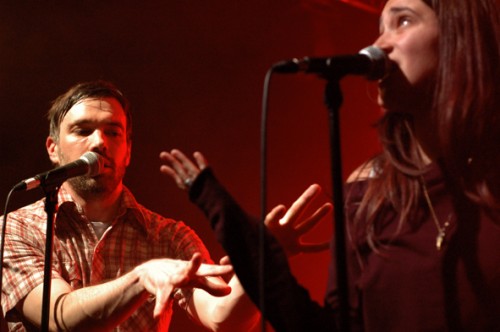
HHC: I know that you read a lot too! And that you especially like writers from the Beat generation like William Burroughs, Charles Bukowski and others. Did they inspire your songs as much as movies did?
B65: Yeah. I was never a very big fan of Jack Kerouac for example, but I did like his ideas. He's famous for this idea of very spontaneous writing and not editing, just capturing the moment. He had the idea that if you go back and you change your work then it's not true anymore, and when I first heard this idea when I was young I really liked it and I really understood why it was important and why he was saying that. I don't know why it became so important to me but it did, and to this day it's a rule for me that I live by, I never ever go back and change my work. I write it once only, I just sit and write until it's finished and I just leave it as it is. Even if I know later that I could make it better, the only thing that I would possibly do is just completely throw it away. And that doesn't happen too often, but sometimes. But this idea, it resonates I think with hip-hop music, with the idea of freestyling, it's basically the same thing. Kerouac was inspired by, and all those guys were inspired by, what was happening in jazz at that time with be-bop and heavy improvisations. I just thought that in many ways, these guys are hip-hop before hip-hop. And also I'm just very fascinated by American culture from the 50's because in my mind what makes the idea of the underground interesting and exciting is the idea that it's a dangerous place and a dark place, very mysterious. I think the only way that it can be this way is if the mainstream is very conservative. And if you look at American culture and maybe even European culture before this, in the 20's and the 30's it was bohemian, and bohemian culture was quite popular. When you have that popular culture that is very open in this way, it is very difficult to shock people. But when you look at American culture in the 50's, before you think of the Beat generation, you think of the extremely conservative culture and these crazy images of crazy square fashion and guys wearing pink and the music was - like the pop music – was so innocent and simple and silly, just like your white conservative America and good times. But then when you see what was going on underground it's extremely shocking, even by today's standards. When you think of other icons of the 50's underground like Bettie Page who was taking her clothes off and doing photo shoots of S&M and bondage, in the 50's it was like "Oh my god!!". That to me captures my real fantasies of the underground and when I look at the underground now, no matter where you're looking, specifically if it's hip-hop or film making or anything, it's just not the same, it's a nice and romantic idea, but it's so hard for us to be truly shocked now. So I have a lot of very romantic notions towards this time and the Beat generation is a big part of that, it's just like idealism I guess, I wish I was alive at that time. I think I fantasize that way all the time when I'm writing. In fact I'm working on an album right now that is completely inspired by and all about the 50's, like I just decided to completely focus in that way and stop pretending like "okay, I'm just really going to go back to the 50's".
HHC: Now that you work more and more with instruments in your music, do you still continue to dig in the crates, searching for the ultimate break?
B65: Yeah, a lot! In fact it's probably getting deeper now than ever before. One thing that was very difficult for me is that before I signed my record deal I always lived in the same place, Nouvelle Ecosse in Canada, and I was living with my vinyl collection all the time. Then when I signed my record deal I moved to France and I brought with me maybe 50 of my favourite's vinyls because it's very difficult to carry. And I moved to London, and then I moved to New York, basically for four or five years I didn't have my vinyls collection with me. I was always buying vinyls but it was impossible to move around with them. Now I have been back in France for almost two years now and finally, because I have a stable home, I'm bringing my vinyl collection here and I'm just buying much more so now it's really beginning to grow again, and it's becoming more and more exciting for me. Another thing that was difficult in the years before was to have a studio where I could work all the time, this is also something I'm beginning to build now. So for the first time in maybe four or five years, today, I can sit down where I live, have all my vinyls and a small studio where I can work. The production that I've been working on this year is all based on incredible records that I have been collecting in the last few years and I'm really excited about it. I have a few pieces of music in particular that I'm dying to release to the public because it's just going to do so much damage I think. This a big part of the reason why this year I think is going to be a very different and special year for me. I know that probably around the end of this year I'm going to go back into a big studio with a budget, and work on my next album for Warner. But between now and then I think I'm going to be doing a lot of projects at home, putting music on the internet and just giving it to my friends. Already this year there have been two albums basically like underground albums, one called "Strong Arms" that I talked about before and another one called "Pole Axed". I also mentioned this album that I'm working on now, that's about the 50's, this is like another kind of thing, maybe an underground kind of project with a guy named Skratch Bastid, Mr Dibbs and DJ Signify. And I have a few others ideas for more underground projects that I want to do this year, it's going to be all about working alone with the sampler and all the records I've been collecting. I want to use this technique more for the Warner album, I was speaking recently to one of the guys that I've been working with for a long time and he was telling me how much he enjoyed working on the "Square" album, and this was the first album where I began working with instruments but it was still mostly based around breaks and samples, using the instruments just to kind of add touches and little elements, and I agreed with him that this was a good way to approach making songs, so I think returning to the studio in this way, with the combination of live and sampled stuff, I think it's something that we're interested in doing again. Plus I just have so many really good records that I'm dying to use, so I mean of course it's tricky being on a big label and I can get in trouble much more easy, it's exciting especially now I'm just feeling very deep into that right now.
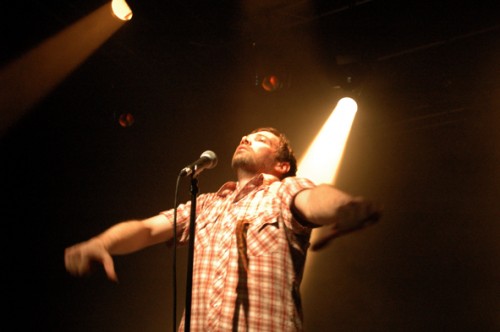
HHC: Are you still in touch with the Halifax hip-hop scene? What do you think about its evolution? The scene seems to have a hard time making a comeback…
B65: [I see them] As much as possible! It's a very important thing for me because it's where my roots are, and things that I care about, I want to continue to be involved and to create opportunities for talented people that I know who come from there, but the problems that they have there are the problems that existed before me, and they are still there now after I left which is… first just the fact that it's an area where there are very little resources, the economy there is very bad so people are poor. There aren't very many studios, everyone wants to be a rapper, so there are no producers, no dj's, not enough anyway. It's very difficult to get recognition because it's an isolated place and people don't travel there because there are not a lot of reasons to do that. Also the difference with me is that I was maybe the first person from there who said "OK, it's obvious that the world is not going to come to me and discover my music, so the only way this is going happen is if I travel". That's difficult to do, it takes a lot of courage and maybe you have to be just to be a little bit crazy to do that or something, but I haven't really seen anybody else who has been able to do that, and I don't know if it is just fear or what. There is no glamour to it at all, you have to face the reality that you have to leave and maybe spend a few years where not only you'll not be making any money but you'll be losing money, and maybe a lot of money! It's going to be very difficult for your health and for your brain and everything. And after maybe two or five years, there is no promise that things will be good for you after that. So there is not a lot of strong reasons for people to do it, I was just crazy enough to do it. It does make me sad because there is so much talent there and so I feel like it's my responsibility a little bit to go back and work with people from there because I think what they do really deserves to be heard, and it breaks my heart a little bit.
HHC: There are rumours of a Buck 65 & Sage Francis LP…
B65: We talk all time, and have talked a lot about doing more work together because we've now been working together on different projects for many years. He sent me some music not too long ago and I sent him some music. It's just a little bit difficult because we both travel all the time and he lives in the US and I'm spending most of my time here, so just to find time to get together to do work, that's the biggest challenge. It's something we both want to do and in the meantime we just talk on the telephone and on the internet about ideas. I think that there are a few people in underground hip-hop, and especially in the scene where I come from, that are going to be extremely interesting to watch in the next few years. Sage Francis is definitely one of those people, Edan is another one, there is a guy who has been a part of the Rhymesayers group, Crescent Moon (cf. Oddjobs/Kill the Vultures) who I think is gonna be an extremely interesting person to watch and the reason why I say that is because, knowing these guys personally, I've seen in them a real awakening. Their minds are very hungry and they're people who I suppose a little bit like me are not satisfied to just do like the same thing for ever. I'm seeing all these guys and old friends buying instruments and learning how to play them. You listen to the last album of Edan and he's extremely into psychedelic rock music, and it's like "Wow, where is that going to go!". I know he's a very big fan of Bob Dylan, Crescent Moon is the same way, he's a big folk music fan. The last time I was talking to Sage Francis he could only talk about Neil Young, so I think there is gonna be some crazy and interesting changes in the music in the next few years. So I become highly selective with the people that I want to work with and people that I think I have something in common with, Sage Francis is definitely one of those people, he's almost like a brother to me you know, and plus we're just very good friends. It's funny to me, I think back, even a few years ago, definitely at the time when I was making the "Square" album and to a degree the "Talkin Honky Blues" album, using real instruments in the production was like this new thing and people were reacting to it so strangely, in every interview I did it was like "What are you doing! This is crazy!". Now I look around and so much of what's happening in hip-hop music, not just underground but even in a big way, whether it's like Kanye West or anybody else, it just seems to be the way that the music is evolving and I think "Hmm, well isn't that interesting!". There are even some of my friends who at the time couldn't understand what I was doing, some even seemed to be upset like "What are you doing! You can't do that!" and now those same friends are doing it themselves, learning to play piano and bass and all these things, I can just laugh. I had two or three, maybe four years where I had to burn and have a hard time, take a lot of heat and damage and people throwing things at me. But things are okay now, and people are beginning to open their minds a little bit to these ideas and I think it's good, music really need to continue to grow and evolve and for a long, long time. Hip-Hop music in some areas wasn't really evolving I think. In the area of djing its evolved pretty well through the years and it really got accelerated around the middle of the 90's until now, before that it was slow for a while, the area has stayed exciting a long time. But in terms of production, I think for a long time it went up, up, up and it got really exciting, and at the beginning of the 90's it was, I hate to admit it but it actually went down and it got worse I think for a while. Something that was very important to me when I made the album "Language Arts", "Vertex" and definitely with the Sebutones album, was working out how I could take things to the next level and show people something that they'd never seen before, and I can remember when people heard "Language Arts" or "Vertex", that's when everyone was saying "I've never heard hip-hop like this". And I thought "Good". And then maybe by the time 'Man Overboard' came, people were saying that a little bit less to me because I had done that a couple time before, I thought it's time to show people something new again, "Talkin Honky Blues" came out and again people were like "Wow! I've never heard something like that before". Some people were saying it almost like it was a bad thing but to me even if they didn't like it was good like "Okay good I'm shaking you up", and to me that's always something that I wanted to do like "how can I just recognise where the limits are and then just destroy them and move past them". To me that's what keeps me interested in making music and I hope I can just do that for my all life.
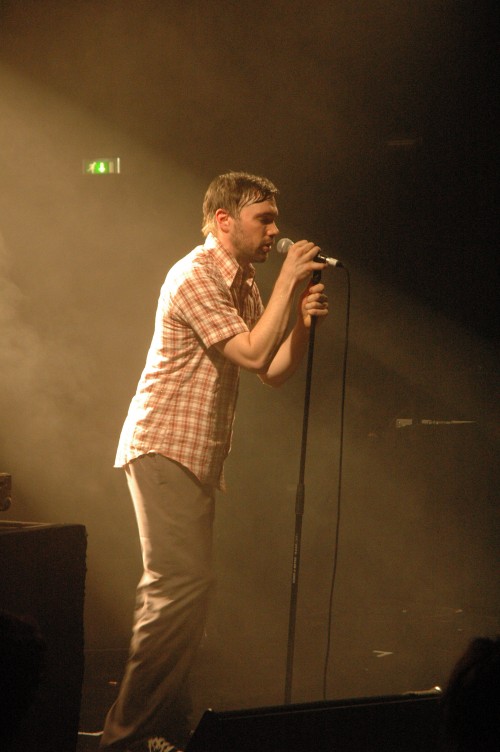
HHC: You're performing tonight in Reims with Airborn Audio (M.Sayyid and Hight Priest). You already toured with Anti-Pop Consortium some years ago. Are you interested in their music? What do you think of it?
B65: Yeah, I toured with APC before and after that I toured with Beans solo a few times, and I've remained friends with him since. One thing that I always found interesting about him and all of those guys is that even though their music was very different from mine, what we both had in common was a willingness to experiment and do things different, an abstract kind of expression. They were just making very adventurous kind of music. To me, this may sound like a very strange thing to say but if you look at a white guy who went to university, even just to look at the exterior he maybe seems like a strange guy, and you would almost expect the music to be a little bit strange, but to me there is something even more challenging and more exciting, when you get an old school New-York guy… Well, not to turn it into too much of a polemical thing, but a black guy, really willing to challenge convention. In a way I think it takes even more bravery and it's even more radical, it's the kind of thing that is more likely to get people's attention and to be shocking to them, because one area where you could say that things are almost as conservative as American culture in the 50's is in certain segments of hip-hop culture, there are expectations of the music to sound a certain way and for people to look a certain way. When someone like me challenges that I don't think it's quite exactly the same as when someone from New-York, someone really from the inside out smashes it, to me that's terribly exciting, it such a cliché word but I always find myself saying "cool", I think Beans, Priest and Sayyid are the coolest people I've ever seen in my life. In a way that does almost remind me of a time from the past, maybe late 70's in New-York or the 40's. I just think they really have their finger on something so rare that I have only seen a few times, not just in my life, but in history really and I just support that so strongly. Actually I'm really excited to see those guys tonight. And these two I actually haven't seen in a while, so…
HHC: Would you be willing to collaborate with them even if your music is different?
B65: Yeah absolutely, and this actually an idea that I have spoken to Beans about before. I would instantly do something like that and I think what you said, the fact that our music is quite different, is what would make an idea like that so extra fascinating. If Sage Francis and I collaborate, ok cool, but people will almost expect it. But if I collaborate with guys like APC I think it would be a little less expected, and I'm the kind of person who just lives for the unexpected.
HHC: Like your collaboration with Omid on the "Monolith" album…
B65: Exactly. The more unexpected the opportunity to collaborate, to me, the more exciting that is, I love to see things that don't belong together, together, whether it's in films or anything. I'm always looking for that.
HHC: I'm set to interview Airborn Audio just after the show, do you have any questions for him?
B65: I guess the thing I would be the most curious to ask those guys, honestly and genuinely, is "Are they conscious of the idea that what they do is very brave and challenging" because I think there are two ways that that could go. There could be the person who is very conscious of it like a radical thing, like "I know that this is gonna be difficult for people and for the people from my community, and this may look really weird to some people but I'm going to do it". Or, and this is equally interesting and fascinating, if it's not conscious, if it's just that who the person is really deep inside and they're not even thinking about it, but just expressing themselves as honestly as they possibly can. And you know, from touring with these guys and spending time with them, even in that time I couldn't decide for myself, which way it was, and I would like to somehow know if it is a conscious thing or if it's just "this is who I am".
Interview by Phara
Retranscription by Phara and Naïma
Questions by Phara and Cobalt
Photos by Romain Klapka and Sébastien Baritussio
May 2008
P.S. : Interview originally recorded in May 2006.